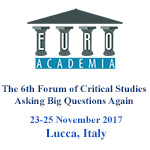Euroacademia Conferences
 Europe Inside-Out: Europe and Europeanness Exposed to Plural Observers (9th Edition) April 24 - 25, 2020
Europe Inside-Out: Europe and Europeanness Exposed to Plural Observers (9th Edition) April 24 - 25, 2020 Identities and Identifications: Politicized Uses of Collective Identities (9th Edition) June 12 - 13, 2020
Identities and Identifications: Politicized Uses of Collective Identities (9th Edition) June 12 - 13, 2020 8th Forum of Critical Studies: Asking Big Questions Again January 24 - 25, 2020
8th Forum of Critical Studies: Asking Big Questions Again January 24 - 25, 2020 Re-Inventing Eastern Europe (7th Edition) December 13 - 14, 2019
Re-Inventing Eastern Europe (7th Edition) December 13 - 14, 2019 The European Union and the Politicization of Europe (8th Edition) October 25 - 26, 2019
The European Union and the Politicization of Europe (8th Edition) October 25 - 26, 2019 Identities and Identifications: Politicized Uses of Collective Identities (8th Edition) June 28 - 29, 2019
Identities and Identifications: Politicized Uses of Collective Identities (8th Edition) June 28 - 29, 2019 The European Union and the Politicization of Europe (7th Edition) January 25 - 26, 2019
The European Union and the Politicization of Europe (7th Edition) January 25 - 26, 2019 7th Forum of Critical Studies: Asking Big Questions Again November 23 - 24, 2018
7th Forum of Critical Studies: Asking Big Questions Again November 23 - 24, 2018 Europe Inside-Out: Europe and Europeanness Exposed to Plural Observers (8th Edition) September 28 - 30, 2018
Europe Inside-Out: Europe and Europeanness Exposed to Plural Observers (8th Edition) September 28 - 30, 2018 Identities and Identifications: Politicized Uses of Collective Identities (7th Edition) June 14 - 15, 2018
Identities and Identifications: Politicized Uses of Collective Identities (7th Edition) June 14 - 15, 2018
The Integrative Power of Non-Representationalism in Urban Spaces: Creative Collaboration and Local Identity among Immigrants and Ethnic Minorities in Brussels
-
-

-
Presentation speakers
- Joseph M. Costanzo, Independent Researcher, Geneva, Switzerland
Abstract:
European scholarship has begun paying greater attention to the social and economic nature and impact of creative expressions in urban spaces (Delhaye, 2008; Küchler, Kürti and Elkadi, 2011; Salzbrunn, 2007; Selberg, 2006; Spangler, 2007). Furthermore, borrowing the term from Bramadat (2001), the literature concerning immigrants and ethnic minorities and creative art forms focus on expressions of local ‘ethno-cultural’ groups (allochtoon or not). Such spectacles are expressions that, for a brief moment, recall and re-present traditional notions of foreignness in their dress, music, cuisine and so forth as reminders of the way things were (or are perceived still to be) in a distant homeland. My interest here is in the non-ethnically representational spectacle of cities. In other words, events that, instead of re-presenting a history of a people, culture or place, are born out of the people and culture in place today—a (temporary) contemporary expression of local diversity and local identity. Here, as in Brussels’ Zinneke Parade, the emphasis is on creating and presenting (not re-presenting) the contemporary local. I suggest that immigrants and ethnic minorities and their art are not merely re-presenting their migration histories, but also are part of the ongoing local discourse, influencing identities and expressions not as ‘immigrant artists’ (read: artists of immigrant origin who create ‘immigrant art’), but as artists full stop. Such creative spaces and interactions may serve as a place without a priori (assigned) social and economic personal value, valuing individual abilities and interests, creating collaboration through tension and discussion, allowing human error and generating social, psychological and economic benefits for those involved.
-
Related Presentations

A Brief History of the Inhumanities and Contemporary Humanities Studies
- William H. Bridge

The Insignificant Girl
- Manasee Jog

New Frontiers in Indigenous Economies: The Example of the United States
- Susanne Berthier Foglar













